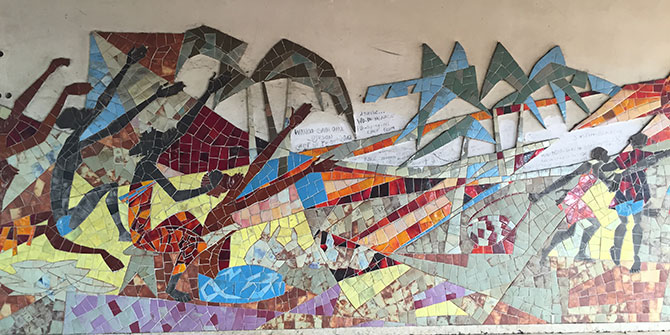Samantha R Lattof discusses the challenges female migrants in Accra face in securing health care.
Every week while collecting the data for my recent article in Health Policy and Planning, I heard reports of female migrants dying in Accra, Ghana. Some of these deaths were accidental. Others, like deaths from malaria or delayed care during childbirth, could likely have been prevented. Women face unique challenges accessing health care that result from their ability to access and control resources as well as their ability to make personal health decisions. Female migrants accessing health care may experience double segregation and vulnerability based on their gender as well as their migrant status. For female migrants working in the informal sector, such as those in this study who worked as market porters (kayayei), these factors frequently result in being disadvantaged and excluded from the health care system. They also contributed to poor health outcomes.
Female migrants and barriers to health care
As reported in Health insurance and care-seeking behaviours of female migrants in Accra, Ghana, some of this exclusion from the health care system appears self-imposed. Though migrant kayayei value health care, survival needs (eg, food, water, shelter) understandably take precedence. As a result, female migrants may prioritise self-care since they cannot afford to take time away from work. They may use temporary fixes, such as obtaining medicine of questionable efficacy from a peddler, to address the health problem until the problem stops them from working. The health system may also directly perpetuate this disadvantage and exclusion, when providers discriminate against or stigmatise migrants. The research team witnessed this behaviour first hand when we took an unconscious kayayoo migrant to the hospital for urgent care. Upon our arrival, the triage nurse’s first words were: “Why was she beaten? Did she steal something?”

While recently ill/injured participants in this study desired health care, less than half sought formal or informal health care. The unpredictable nature of out-of-pocket expenses restricted both insured and uninsured migrants from seeking formal health services. Financial barriers overwhelmingly limited migrants from seeking health care, from taking time away from work, from registering with Ghana’s National Health Insurance Scheme, and from renewing their expired health insurance policies. Though health insurance exemptions exist for children and for the poor, these particular exemptions were largely inaccessible to migrant kayayei.
One reason that insured participants in this study were less inclined to seek formal health care is that only one in four currently insured participants reported holding a valid health insurance card in Accra. Migrants often forget their health insurance cards at their place of origin, particularly if their migration resulted from urgent circumstances, such as leaving an abusive partner. Migrants were also at risk of losing their health insurance cards after arriving in Accra due to problems (eg, fires, flooding, theft) with unsecure housing or homelessness. Without valid health insurance cards in their possession, insured migrants effectively experienced similar financial barriers to care as uninsured migrants.
For many migrant kayayei, accessing healthcare in Accra also requires the services of a translator who speaks English or Twi. This combination of financial and linguistic barriers makes access to formal health care largely inaccessible to a population that suffers from greater illness/injury than the general female population in Accra.
Deaths from malaria and childbirth are tragic regardless of the setting. But to hear of such deaths from women obtaining delayed care in Accra, where Ghana’s concentration of health facilities is highest, reveals a need to recognise that accessing health care as a migrant involves much more than one’s distance to a health facility or health insurance enrolment. The formal health system must better address equity within the health insurance scheme so that migrant populations do not have to choose between food and health care.
This article was first published on Health Policy and Planning Debated from the London School of Hygiene and Tropical Medicine.
Samantha R Lattof (@slattof) is a LSE alumna and a global health consultant with over ten years of experience conducting research as well as managing and driving global health programs and projects.
The views expressed in this post are those of the author and in no way reflect those of the Africa at LSE blog, the Firoz Lalji Centre for Africa or the London School of Economics and Political Science.





